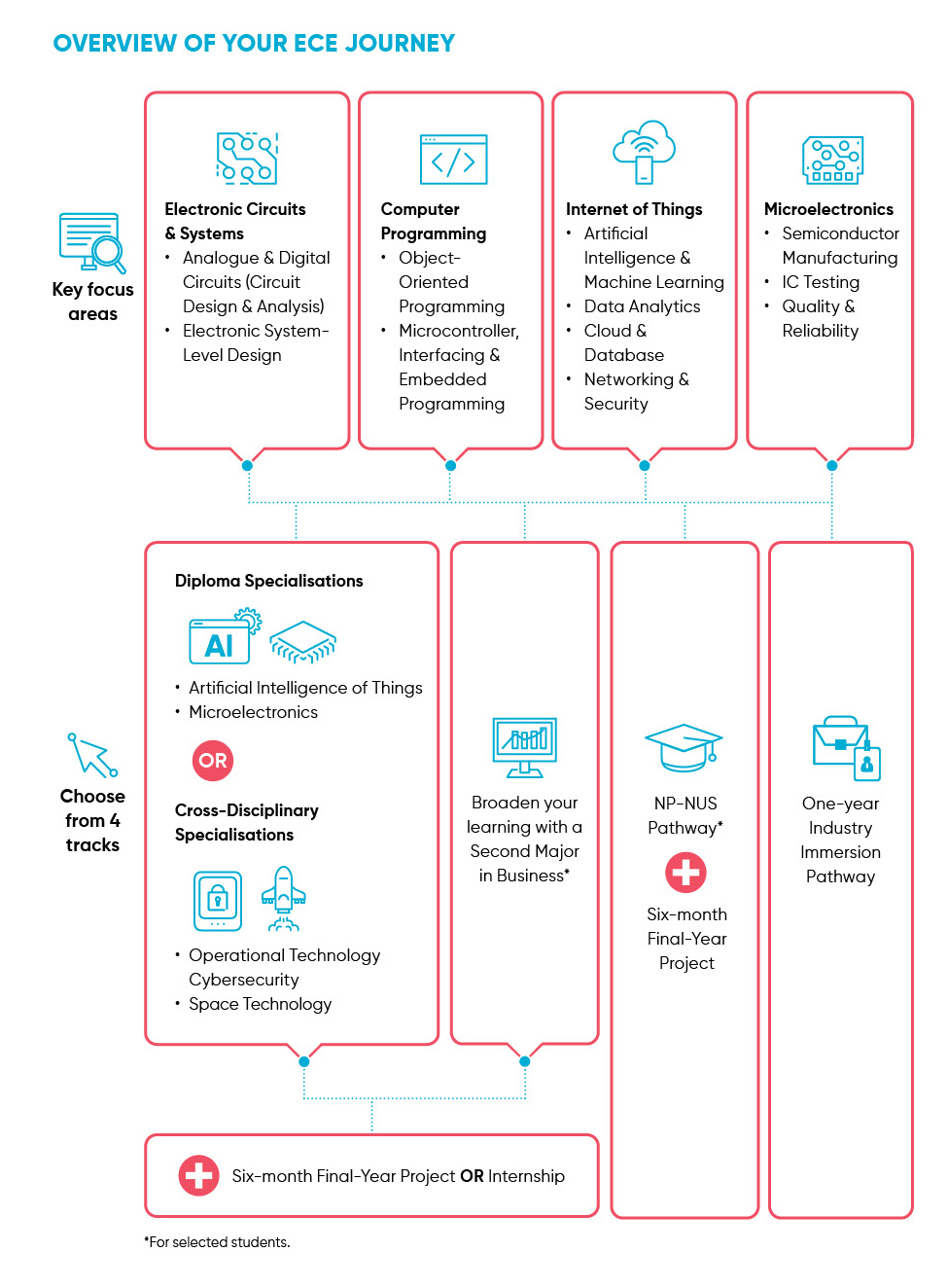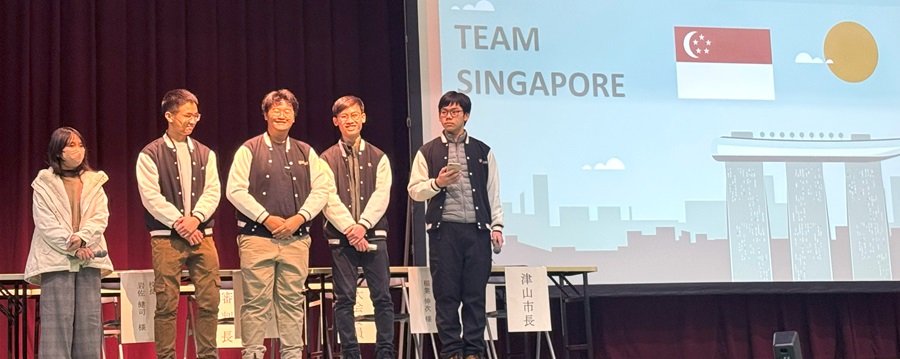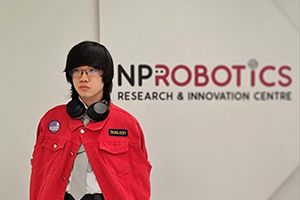Why ECE?
- One of the most established electronic and computer engineering diplomas in Singapore
- Broad-based curriculum with strong foundation in electronics, software programming, communication technologies and in-demand fields such as Internet of Things (IoT), Data Analytics, Cloud Computing, Artificial Intelligence (AI) & Machine Learning
- Choose one of four specialisations to hone your skills - Operational Technology Cybersecurity New, Space Technology New, Artificial Intelligence of Things (AIoT) or Microelectronics
- Unlock new opportunities for your career and further studies with a Second Major in Business
About ECE
Who can live without electronics and computers in this day and age? From our smart phones and laptops, to the vehicles that we travel in daily, play a part in transforming the way we work and play with the Diploma in Electronic & Computer Engineering
(ECE).
ECE will introduce you to the important fields of electronic engineering, as well as computer hardware and software. You will develop essential core knowledge in electronic circuit & system design, software programming and communication technologies.
You will be exposed to semiconductor manufacturing, and the latest digital technologies of Industry 4.0, such as Artificial Intelligence & Machine Learning, Internet of Things, Data Analytics, Cloud Computing, and Networking & Security.
Get an extra edge by pursuing a Second Major in Business*, delivered by NP’s esteemed School of Business & Accountancy. This dual qualification will unlock new opportunities for your career and further studies.
Get career ready with our industry-driven curriculum,
co-developed with key partners such as Amazon
Web Services, CISCO Systems, National Instruments
and United Microelectronics Corporation. In addition,
gain opportunities to top up your knowledge and
skills to attain relevant industry certifications such as
AWS Certified Cloud Practitioner through vacation
bootcamps.
Put your knowledge to the test with a six-month
internship with industry leaders such as ST
Engineering and GlobalFoundries, and industry-sponsored projects at NP’s technology centres. Plus,
undertake local or overseas study trips to widen your
exposure to the exciting world of engineering!
Gain real-world experience, expand your professional
network, and build skills for your future with the
Industry Immersion Pathway, which offers a choice
between a one-year internship or project.
Start your uni studies ahead of your peers through the NP-NUS Pathway! This programme allows you to read uni modules and earn credits that count towards your future degree at NUS.
In your final year, you can choose from the following:
- Artificial Intelligence of Things:
Learn how AI is applied in electronics and the Internet of Things (IoT) to develop smarter devices and systems with optimised features and functionalities. - Microelectronics:
Gain hands-on experience in the manufacturing of integrated circuits, covering both front- and back-end semiconductor fabrication, quality control, reliability, and integrated circuit testing. - Cross-Disciplinary Specialisations
Get future-ready by acquiring transferable skills in niche engineering fields by specialising in Operational Technology Cybersecurity or Space Technology.
Overview of Your ECE Journey

Further Studies
This diploma is recognised by leading universities both
locally and abroad. You may be granted advanced
standing or module exemptions when applying for
related degree programmes at local universities and
overseas universities in countries such as Australia and
the United Kingdom.
Careers
Electronics is one of the world’s largest industries – that means you will enjoy many diverse and exciting career opportunities, such as:
- Associate Embedded Systems Engineer
- Assistant IoT Solutions Engineer
- Assistant Equipment Engineer
- Assistant Process Engineer
- Assistant Product Engineer
- Assistant Quality Engineer
- Assistant Facility Engineer
- Assistant Integration Engineer
Entry Requirements
AGGREGATE TYPE ELR2B2-C
To be eligible for consideration, candidates must have the following GCE ‘O’ Level examination (or equivalent) results.
| Subject | 'O' Level Grade |
|---|---|
| English Language | 1-7 |
| Additional Mathematics/Mathematics | 1-6 |
| Any one of the following subjects: Biology Biotechnology Chemistry Computing/Computer Studies Design & Technology Electronics/Fundamentals of Electronics Physics Science (Chemistry , Biology) Science (Physics, Biology) Science (Physics, Chemistry) | 1-6 |
Applicants must also fulfil the aggregate computation requirements for the ELR2B2-C Aggregate Type ( English Language, 2 relevant subjects and 2 other best subjects) listed at www.np.edu.sg/docs/ELR2B2.pdf.
For students with other qualifications, please refer to the NP website for the entry requirements and admissions exercise period.
Candidates with colour vision deficiency, severe vision deficiency, profound hearing deficiency, uncontrolled epilepsy and/or severe physical impairments may encounter difficulties meeting the course requirements and expectations.
What You Will Learn
Engineering Mathematics 1
This module is designed to provide students with the fundamental skills in mathematics required to solve basic engineering problems. Topics are introduced in an order that is intended to keep
abreast of the application requirements in engineering modules. The emphasis in each topic is on simple applications and problem solving. Topics include algebra, trigonometry, logarithms, plane analytic geometry, matrices and complex numbers. Throughout
the module, there is appropriate use of a Computer Algebra System.
Electrical Engineering Fundamentals
This module provides a foundation in electricity covering basic concepts of electrical circuits and
the methods used to analyse them. The module emphasises the understanding of the basic electrical circuit laws (Ohm’s Law, Kirchhoff’s Voltage and Current Laws) and network theorems, and their application to electrical network analysis.
Topics covered include fundamentals of electricity, network theorems, capacitance, electromagnetic induction and inductance.
Mechanical Engineering Fundamentals
This module introduces students to the study of external
forces in two dimensions and their effect on particles and rigid bodies that are at rest. Students learn the skills to analyse the forces acting on the bodies by drawing free-body diagrams and applying the conditions of equilibrium. Topics include
forces and resultants, moments and couples, equilibrium and the concepts of plane friction. This module also aims to equip students with the skills to analyse problems of rigid bodies in motion. Only linear motion in two dimensions will be covered.
Topics include kinematics and kinetics of linear motion
Programming
This practice-oriented module equips students with basic knowledge and skills in computer programming using a suitable high-level language. The main
topics include basic computer programming concepts and fundamental programming constructs such as sequences, selection and repetition.
Career & Engineering Professional Preparation
This module aims to give
students a head-start in their professional careers as they transit into a polytechnic engineering education. The module will equip students with knowledge and skills that can help them chart, navigate and advance in their individual education and
career pathways. Students will be guided in adopting a design thinking approach towards making their education and career plans. They will be exposed to career-centric self-assessment tools and online resources. As part of our efforts to help students
benefit from the ubiquity of a professional online presence, students will also establish their online professional brand by showcasing their marketable knowledge, skills and competencies.
To kickstart our students personal and professional
development, the module will also impart various knowledge and skills, such as, cultural intelligence, financial literacy, digital literacy, industry networking and safety. The topic on safety will be taught according to the Competency Unit “Develop
a Risk Management Implementation Plan” from the Singapore Workforce Skills Qualifications (WSQ) National Competency Standard. To augment this qualification, students will participate in industry engagements and service projects to glean the
importance of safety in the engineering profession and societal context.
Innovation Made Possible^
This module aims to help students discover and hone their innate ability to think creatively and come up with innovations to tackle problems close to their hearts. Underpinned by the Design Thinking framework,
students will be sensitised to the process of user-centric problem solving. They will be introduced to concepts such as empathy, problem-definition, ideation, prototyping and testing through a practical approach featuring engaging out-of-classroom
activities, just-in-time master-classes and a hands-on, “learning by doing” delivery format. Ultimately, the module will help students recognise that innovation is attainable and fun and develop creative confidence to explore new ideas
in their studies and beyond.
English Language Express^*
^* For selected students only.
Engineering Mathematics 2
This module is designed to provide students with the fundamental skills in mathematics required to solve basic engineering problems. Topics are introduced in an order that is intended to keep abreast
of the application requirements in engineering modules. The emphasis in each topic is on simple applications and problem solving. Throughout the module, there is appropriate use of a Computer Algebra System. Topics include trigonometry, differentiation
and simple integration with applications.
AC Circuits
This module provides students with basic knowledge of the fundamental principles in electric circuit analysis. The module extends DC network theorems
to AC circuits which involve impedances such as capacitance and inductance. The module also includes analysis of simple AC series, parallel and series-parallel combination circuits, concept of AC power and understanding of power factor and its effect
on electrical energy usage.
Analogue Electronics
The aim of this module is to lay the foundations in analogue electronics. At the end of this module, students will acquire content knowledge and understanding
on the basic concepts of analogue electronics and some applications.
Key topics covered in this module include operating characteristics, working principles and applications of discrete electronic devices such as various types of diodes,
MOSFETs and BJTs. Practical circuits will be used to enhance and strengthen the learners’ knowledge so that they will acquire the relevant competencies to move on to more specialized modules.
Digital Fundamentals
This module introduces the basic concepts of digital systems. It covers the basics of combinational and sequential logic circuits. Flip-flops and their application in counters and registers will also be discussed. This basic knowledge is essential
for students to be able to understand, analyse, and design basic digital circuit system.
Fundamental Electronic & Electrical Skills
This module aims to integrate the knowledge learnt in the semester and understand
the relevance and application of the modules learnt. Students will work in teams and undertake the projects/case studies underpinned by the design thinking and electronics prototyping using a microcontroller. On completion of the module, students
will be able to apply the skills and develop confidence in tackling projects at the higher levels.
Confident Communication: Find Your Voice (VOICE)^
This module is designed to empower students to become thoughtful and confident communicators, while discovering their personal voice in self-expression. It equips students with the
skills to communicate with impact in a variety of settings, by tailoring their message to suit audience, purpose and context. Students will learn how to utilize storytelling structures and techniques, persuasive strategies and effective visuals to
connect meaningfully with their audience. The module also features a personalized growth plan that enables students to customize their learning experience according to their individual needs and aspirations. Peer learning and coaching circles provide
students the platform to practise their critical reasoning and presentation skills in a safe environment. Ultimately, the module encourages students to reflect on their communication habits and develop practical strategies to enhance their effectiveness
as communicators.
Health & Wellness^
This module provides students with an opportunity to be active, keep fit and stay healthy through basic sports skill acquisition. It also aims to enhance student’s social
and psychological well-being through a variety of sports electives while taking them through the process of character development, choice and decision making.
^Critical Core modules account for 13 credit units of the diploma curriculum. They include modules in communication, innovation and world issues, as well as an interdisciplinary project. By bringing students from diverse diplomas together, the interdisciplinary project fosters collaboration to explore and propose solutions for real-world problems. NP aims to develop students to be agile and self-directed learners, ready for the future workplace.
This module covers the fundamentals of analogue electronic circuit design and applications. The operating principles and design of commonly used analogue devices and operational amplifier circuits are taught in this module. The main topics include various types of amplifiers, comparators and filters. Applications in various practical circuits are also illustrated in this module.
Applied Digital Electronics
This module reinforces the concepts learned in Digital Fundamentals through hands on with real digital circuitries. Key digital building blocks like frequency dividers, multiplexer, de-multiplexer and decoder will be introduced. Basic Integrated Circuit Technologies will also be covered. Students will learn to build and troubleshoot basic digital circuit system.
Network Fundamentals
This module covers the introduction to the architecture, structure, functions, components, and models of the Internet and other computer networks. The principles and structure of IP addressing and the fundamentals of Ethernet concepts, media, and operations are introduced to provide a foundation knowledge and skills for network infrastructure. Upon completion of the module, students will be able to build simple LANs, perform basic configurations for routers and switches, and implement IP addressing schemes.
Object Oriented Programming
This module introduces object-oriented programming to students who already have a foundation in procedural programming. It covers the fundamental concepts of object-oriented programming with introduction to basic web and database applications.
Engineering & Sustainability
This module aims to develop in our students the knowledge, skills and disposition towards sustainability by introducing them to the dominant environmental and climate change issues caused by technological developments. Students will learn about sustainability design in the context of engineering design considerations, such as, resource efficiency, environmentally friendly materials, innovative sustainable products, lean and green operations, remanufacturing and responsible sourcing. In collaboration with community and industry partners, Service-Learning projects provide opportunities for the students to apply and hone their Green skills while developing a deeper understanding of environmental sustainability issues and their social impacts both locally and globally.
The module also encourages students to appreciate and explore green job opportunities in engineering. Career and Professional Preparation 2 is incorporated to equip students with the skills necessary to seek and secure such work opportunities. They will also be equipped to communicate their personal brand more effectively. As students sharpen their communication skills, they will also learn how to market themselves effectively.
Communication Systems
This module covers the fundamentals of analogue communication principles. Key topics covered in this module include components of a basic communication system, and factors that
affect communication performance. The techniques of modulation and demodulation will be explained to allow students to understand and relate important concepts, including signal representation, performance measurements and system applications.
Data Analytics
This module introduces the various methods and best practices that are in line with business and technical requirements for ingesting, modelling, visualizing, and analysing data. Students will acquire knowledge
and skills with Cloud services that are critical for conducting analysis of big data problems by using statistical tools and visualization technologies. Students learn to provide meaningful business value and analysis through easy-to-comprehend data
visualizations.
Internet of Things
This module provides an introduction on IoT fundamentals through a real-world IoT project. Students will acquire relevant knowledge and skills in IoT connectivity, embedded programming, electronics
prototyping, test & measurements. Students will also undertake design and development of the real-world IoT project.
Microcontroller & Interfacing
This module aims to equip students with a basic foundation
in microcontroller and Embedded System. Students will acquire the necessary skills and knowledge through meaningful practical exercises and other activities. The knowledge and skills that the students acquire in this module will enable them to implement
a microcontroller-based system.
Servers & Cloud Fundamentals
This module introduces cloud computing concepts, providing an overview of core
cloud services, security, architecture, pricing, and support. It
also covers the use of Linux as a guest operating system in a virtual machine. Students will acquire knowledge and skills in the deployment, configuration, and operation of virtual machines in the cloud and the use of virtual machines to host basic
online services.
World Issues: A Singapore Perspective^
This module takes a global approach to significant current and historical
events. The aim is to enhance students’ understanding of such events and issues in the context of Singapore, as well as challenge students to think critically about choices and decision-making vis-à-vis the nation state.
^Critical Core modules account for 13 credit units of the diploma curriculum. They include modules in communication, innovation and world issues, as well as an interdisciplinary project. By bringing students from diverse diplomas together, the interdisciplinary project fosters collaboration to explore and propose solutions for real-world problems. NP aims to develop students to be agile and self-directed learners, ready for the future workplace.
Artificial Intelligence of Things (AIoT) Specialisation Modules
AI Applications
This module provides hands-on experience in deploying simple AI models for embedded devices. Using a development platform for machine learning, students will work with different sensors to develop real-world applications.
Capstone Project
This module is designed to apply and integrate concepts and skills acquired throughout the course through a structured project-based learning approach. The project will focus on relevant fields within the course, emphasizing how electrical/electronic hardware, computer software, and communication devices can be combined to perform specific functions within larger systems. Additionally, students will engage in team collaboration, problem-solving (including troubleshooting), and documentation & presentation of their work.
IoT and Cloud Security
This module provides a foundation of cybersecurity principles and services for cloud computing, as well as IoT Security. Students will learn how to identify security benefits and responsibilities of using the cloud services. Identity and access management, secure network access to cloud resources, available methods for encrypting data at rest and data in transit, and cloud services that can be used for monitoring and incident response will be discussed.
Machine Learning with Python
This module introduces basic AI concepts and algorithms using Python programming. Standard Python libraries will be used to develop simple machine learning/deep learning model which can be applied to solve typical prediction or classification problems.
Microelectronics Specialisation Modules
Capstone Project
This module is designed to apply and integrate concepts and skills acquired throughout the course through a structured project-based learning approach. The project will focus on relevant fields within the course, emphasizing how electrical/electronic hardware, computer software, and communication devices can be combined to perform specific functions within larger systems. Additionally, students will engage in team collaboration, problem-solving (including troubleshooting), and documentation & presentation of their work.
IC Testing, Assembly & Packaging
This module will provide students with knowledge of integrated circuit (IC) packaging processes, digital IC testing and the assembly processes of integrated circuits. Students will undertake practical sessions in testing, dicing, mounting, decapping, moulding and wirebonding.
Quality and Reliability
This module prepares students to apply statistical software to analyze data for quality system management. Topics cover quality tools and techniques including Statistical Process Control for quality assurance, Design of Experiments for optimizing and improving products and processes. Repeatability & Reproducibility for measurement system analysis, Statistical Hypothesis Testing for root cause analysis, Lean Manufacturing for waste elimination, Six Sigma Methodology for defect reduction in the semiconductor industry, as well as Quality Management Systems and Audits.
Semiconductor Manufacturing
This module aims to provide students with an overview of microelectronics, including
IC design, mask layout, semiconductor technologies and the different stages of semiconductor manufacturing. Students are introduced to the metrology tools and the wafer fabrication equipment.
Operational Technology Cybersecurity Specialisation Modules
AI Applications
This module provides hands-on experience in deploying simple AI models for embedded devices. Using a development platform for machine learning, students will work with different sensors to develop real-world applications.
Cyber Governance, Risk & Compliance
This module examines the relevant frameworks to ensure that information assets are protected within an organization. It includes the processes and policies for administering and managing a company’s IT systems that follow the compliance framework. Concepts on risk management process, risk analysis and mitigation will also be introduced. Students will learn to evaluate risks against the company’s critical assets and deploy safeguards to mitigate them. Control frameworks such as PCI (Payment Card Industry), ISO 17799/27002, and COBIT will be covered.
Fundamentals of Operational Technology Cybersecurity
With Industry 4.0, the modern Industrial Control System (ICS) are facing more advanced threats from the Internet outside as a result of the Informational Technology/ Operational Technology (IT/OT) convergence. Protecting them through Operational Technology (OT) cyber defense is an evolving field required to continually adapt cybersecurity strategies so as to maintain the safety and reliability of production operation.
This module aims to equip students with the knowledge of design, maintenance and protection functions within the Operational Technology (OT) environment. Using a case study of a simulated environment with Industrial Internet of Things Capability (IIoT) capability, the student perform activities with relevance to OT cybersecurity administration and maintenance in order to establish a secure OT environment. This includes performing asset discovery, managing vulnerabilities in existing OT systems, as well as performing access control management across OT systems and devices
In addition, the module also introduces the concept of industrial networking and various cyber security standards, protocols and frameworks and are knowledgeable in using various cybersecurity tools to perform their job accordingly.
Industrial Automation
This module aims to equip students with the basic knowledge of automation technologies and their applications in the manufacturing and process industries. With the rise of new digital industrial technology, known as Industry 4.0, students will also be introduced to smart sensors and actuators using IO-Link technology. This technology enables communication within the system (host controller) down to the sensor level.
Major topics include electro-pneumatics technology, programmable logic control and IO-Link technology. The essential hardware components used in automated systems, such as sensors, valves and actuators will be applied to the automated systems. Widely accepted industrial control programming language ladder and inline structured text will be covered, in conjunction with the learning of programming logic controllers and computer interfaces.
Laboratory work involves hands-on circuit construction and implementation using these various technologies and techniques, which enhances students’ understanding of the practical aspects of circuit designs.
Space Technology Specialisation Modules
AI Applications
This module provides hands-on experience in deploying simple AI models for embedded devices. Using a development platform for machine learning, students will work with different sensors to develop real-world applications.
Capstone Project: CanSatellite
This capstone module provides students with a unique opportunity to engage in the end-to-end development of a CanSatellite, a miniature satellite housed within the volume and shape of a soda can. Designed to closely mimic the development, integration, testing, and validation phases of an actual satellite bus system, the project simulates industry-standard practices.
Working in multidisciplinary teams, students will design, fabricate, test, and qualify a fully functional CanSatellite that meets specified mission requirements. The experience includes iterative reviews and real-world constraints, culminating in a flight test and post-mission analysis. Emphasis is placed on systems engineering, cross-functional collaboration, and engineering documentation.
Satellite Systems Design and Engineering
This module provides a specialised study of satellite engineering and space systems design. Students will gain a deep understanding of orbital mechanics, the space environment, and the subsystems essential to satellite operation, including power, thermal control, communications, and attitude determination and control. Beyond spacecraft design, the module examines the environments in which satellites are built and launched, addressing ground infrastructure, cleanroom and testing facilities, launch vehicles, and the regulatory frameworks that govern access to space. Emphasis is placed on applying systems engineering methods to mission analysis and design, preparing students for advanced research or professional practice in the global space industry.
Year-Long Internship I
The Year-Long internship aims to enhance existing internships to enable a more structured applied-learning pathway co-supervised by company supervisors and polytechnic lecturers. Learning resources such as
learning guides and taskbooks would be purposefully designed to scaffold students’ learning throughout the year-long internship phase. The learning guides and taskbooks would cover the essential knowledge and comprise an inventory of essential
on-the-job tasks designed to cover all desired applied learning outcomes as part of the internship assessment. The contents of the learning guides and taskbooks will be jointly developed with the industry. Students would submit a final report at the
end of each semester and present what they have learned. Assessment would be conducted jointly by the school and company supervisors.
Final Year Project I
This year-long project module is designed to provide
students with practical, hands-on experience while developing skills and knowledge comparable to those gained through traditional structured modules. The module focuses on a comprehensive, real-world engineering problem or innovation challenge, which
students will work on from inception to completion in that semester.
Throughout the project, students will engage in research, design, analysis, prototyping, testing, and reporting, mimicking the processes found in engineering disciplines.
They will be required to apply theoretical knowledge from core subjects, solve complex problems. The project will encourage collaboration, critical thinking, and innovative problem-solving, simulating industry practices and preparing students for
professional engineering roles.
^Critical Core modules account for 13 credit units of the diploma curriculum. They include modules in communication, innovation and world issues, as well as an interdisciplinary project. By bringing students from diverse diplomas together, the interdisciplinary project fosters collaboration to explore and propose solutions for real-world problems. NP aims to develop students to be agile and self-directed learners, ready for the future workplace.
6-month Internship (Local/Overseas)
The six-month internship will provide students with the opportunity to apply the knowledge acquired in the classroom to work situations, and demonstrate problem
solving, communication and interpersonal skills in a work environment. The programme enables students to hone their ability to work independently and in teams, while they take on one or more practical projects under the supervision of industry practitioners.
The objective is to develop a professional approach to work based on the relevant code of practice.
Final-year Project
In this module, students will work in teams to design and develop a product or system related to a
real-world project. In the project, students learn to apply their knowledge and skills in creative problem solving, engineering and design, teamwork and project management. This module focuses on the identification of problem or need, research and design.
Student are required to fabricate the prototype, assemble the parts, test and refine the prototype, and prepare the refined design and a project report. Students are also required to do a final presentation to a panel of examiners.
Year-Long Internship II
The Year-Long internship aims to enhance existing internships to enable a more structured applied-learning pathway co-supervised by company supervisors and polytechnic lecturers. Learning resources such as learning guides and taskbooks would be purposefully
designed to scaffold students’ learning throughout the year-long internship phase. The learning guides and taskbooks would cover the essential knowledge and comprise an inventory of essential on-the-job tasks designed to cover all desired applied
learning outcomes as part of the internship assessment. The contents of the learning guides and taskbooks will be jointly developed with the industry. Students would submit a final report at the end of each semester and present what they have learned.
Assessment would be conducted jointly by the school and company supervisors.
Final Year Project II
This year-long project module is designed to provide students with practical, hands-on experience while developing skills
and knowledge comparable to those gained through traditional structured modules. The module focuses on a comprehensive, real-world engineering problem or innovation challenge, which students will work on from inception to completion in that semester.
Throughout the project, students will engage in research, design, analysis, prototyping, testing, and reporting, mimicking the processes found in engineering disciplines. They will be required to apply theoretical knowledge from core subjects,
solve complex problems. The project will encourage collaboration, critical thinking, and innovative problem-solving, simulating industry practices and preparing students for professional engineering roles.
Second Major in Business
This module reinforces the concepts learned in Digital Fundamentals through hands on with real digital circuitries. Key digital building blocks like frequency dividers, multiplexer, de-multiplexer and decoder will be introduced. Basic Integrated Circuit Technologies will also be covered. Students will learn to build and troubleshoot basic digital circuit system.
Network Fundamentals
This module covers the introduction to the architecture, structure, functions, components, and models of the Internet and other computer networks. The principles and structure of IP addressing and the fundamentals of Ethernet concepts, media, and operations are introduced to provide a foundation knowledge and skills for network infrastructure. Upon completion of the module, students will be able to build simple LANs, perform basic configurations for routers and switches, and implement IP addressing schemes.
Object Oriented Programming
This module introduces object-oriented programming to students who already have a foundation in procedural programming. It covers the fundamental concepts of object-oriented programming with introduction to basic web and database applications.
Engineering & Sustainability
This module aims to develop in our students the knowledge, skills and disposition towards sustainability by introducing them to the dominant environmental and climate change issues caused by technological developments. Students will learn about sustainability design in the context of engineering design considerations, such as, resource efficiency, environmentally friendly materials, innovative sustainable products, lean and green operations, remanufacturing and responsible sourcing. In collaboration with community and industry partners, Service-Learning projects provide opportunities for the students to apply and hone their Green skills while developing a deeper understanding of environmental sustainability issues and their social impacts both locally and globally.
The module also encourages students to appreciate and explore green job opportunities in engineering. Career and Professional Preparation 2 is incorporated to equip students with the skills necessary to seek and secure such work opportunities. They will also be equipped to communicate their personal brand more effectively. As students sharpen their communication skills, they will also learn how to market themselves effectively.
Finance & Accounting for Business
The module imparts basic accounting and finance knowledge to students, in areas such as accounting equations, accounting principles, financial statements, ratio analysis, cash budgeting, short-term financing strategies, time value of money and capital investment analysis. Students will demonstrate their understanding by using financial software to interpret financial accounting information for decision-making in business environments when working on integrated project scenarios.
Economics
This module provides students with an understanding of the core principles of microeconomics and macroeconomics with an application of these concepts in real-world business scenarios. Topics include Demand and Supply, Price Elasticity, Market Structure, Gross Domestic Product, Unemployment, Inflation, Fiscal and Monetary policy.
This module introduces the various methods and best practices that are in line with business and technical requirements for ingesting, modelling, visualizing, and analysing data. Students will acquire knowledge and skills with Cloud services that are critical for conducting analysis of big data problems by using statistical tools and visualization technologies. Students learn to provide meaningful business value and analysis through easy-to-comprehend data visualizations.
Internet of Things
This module provides an introduction on IoT fundamentals through a real-world IoT project. Students will acquire relevant knowledge and skills in IoT connectivity, embedded programming, electronics prototyping, test & measurements. Students will also undertake design and development of the real-world IoT project.
Microcontroller & Interfacing
This module aims to equip students with a basic foundation in microcontroller and Embedded System. Students will acquire the necessary skills and knowledge through meaningful practical exercises and other activities. The knowledge and skills that the students acquire in this module will enable them to implement a microcontroller-based system.
Servers & Cloud Fundamentals
This module introduces cloud computing concepts, providing an overview of core
cloud services, security, architecture, pricing, and support. It also covers the use of Linux as a guest operating system in a virtual machine. Students will acquire knowledge and skills in the deployment, configuration, and operation of virtual machines in the cloud and the use of virtual machines to host basic online services.
Financial Markets & Instruments
This module examines the structure and functions of a modern financial system. Students will learn about the key roles played by the financial markets and institutions, and how the major types of investment instruments, such as stocks and bonds, are being utilised to facilitate the flow of funds. Emphasis is also placed on current issues in the financial sector such as Environmental, Social and Governance (ESG).
Global Business
This module provides students with fundamental knowledge of how the external business environment, consisting of country and industry level factors, affects the overall strategy, organisational structure and various internal functions of international businesses. Students will also discuss how contemporary world affairs, such as the impact of globalisation, terrorism, pandemics, emergence of economic powers in Asia and digitalisation present both opportunities and challenges to international businesses.
Marketing
The module provides students with a strong foundation in marketing, equipping them with the skills necessary to develop effective marketing plans and strategies for the digital landscape. Students will gain a comprehensive understanding of fundamental marketing concepts, with a specific focus on their application in the digital realm.
Foundations of Law
This module gives an overview of the foundational principles of law within the Singapore legal system. It covers essential aspects of Criminal Law, Tort Law, Contract Law, Agency Law, Corporate Law, Intellectual
Property Law, and Technology Law. Students will gain foundational legal knowledge necessary to understand and apply legal principles in technology-related projects.
Integrated Marketing Communications
This module aims to equip students to understand how digitalisation and AI have revolutionised the marketing communication process. Students will learn and apply marketing communication concepts,
leveraging AI tools to reach and engage the target audience at appropriate customer lifecycle touchpoints, culminating in campaign ideation and proposal pitch to a business partner.
Corporate Finance
This module aims to equip students with the fundamentals of Corporate Finance. Students will acquire knowledge on the workings of a firm such as capital
budgeting, equity financing and project valuation, which encompass the use of financial management principles and valuation techniques. Board matters; ESG and corporate actions taken by a firm will also be covered.
Develop a Business
This module is designed to let students learn how to create and validate business ideas, and subsequently start and grow a business/ venture. Students will learn how to apply the Blue Ocean Strategy to create value. Students will also learn to analyse
and present their idea using the Business Model Canvas and carry out experiential activities based on their proposed business ideas.
People & Culture
This module empowers students to design inclusive cultures through
the interdisciplinary blending of organisational psychology and human capital management principles. Students will adopt an applied approach through collaborative experiential opportunities with industry to enhance existing human capital practices,
allowing positive employee experiences and well-being to thrive.





---studio.jpg?sfvrsn=1d599d91_2)

---studio.jpg?sfvrsn=6409ce05_2)
